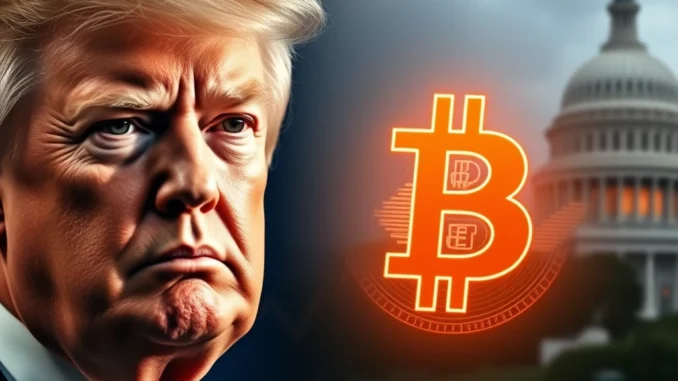
In a stunning revelation unearthed from January financial reports, it has come to light that six prominent members of former U.S. President Donald Trump’s cabinet have disclosed holdings in Bitcoin. This news, reviewed and reported by Fortune, throws a spotlight on the intersection of cryptocurrency and political finance, raising eyebrows and sparking conversations across the digital asset landscape. Are these investments a sign of growing mainstream acceptance of Bitcoin, or do they present potential conflicts of interest? Let’s dive into the details of these cryptocurrency holdings and what they might signify.
Why are Trump Cabinet Members Investing in Bitcoin?
The disclosure of Bitcoin investments by high-profile figures within the Trump administration raises several intriguing questions. What motivates these individuals to allocate a portion of their portfolio to this digital asset? While personal financial strategies vary, several factors could be at play:
- Diversification: Savvy investors often diversify their holdings to mitigate risk. Bitcoin, being a non-correlated asset to traditional markets, can serve as a hedge against economic uncertainties and inflation.
- Belief in Bitcoin’s Future: These cabinet members, with their access to economic insights and trends, might genuinely believe in the long-term potential of Bitcoin as a store of value and a transformative technology.
- Early Adoption Advantage: Recognizing Bitcoin’s early stage in mainstream adoption, these investments could be seen as a strategic move to capitalize on potential future growth.
- Technological Interest: Some individuals might be drawn to Bitcoin due to its underlying blockchain technology and its potential to disrupt traditional financial systems.
Whatever the reasons, the fact that these influential figures are investing in Bitcoin underscores its growing legitimacy within established circles.
Trump Cabinet’s Cryptocurrency Holdings: A Detailed Breakdown
Fortune’s review of January’s financial disclosure reports provides a fascinating glimpse into the specific Bitcoin holdings of these six Trump cabinet members. Here’s a detailed summary of their investments, showcasing the range of involvement:
| Cabinet Member & Position | Cryptocurrency | Value Range | Investment Vehicle/Platform |
|---|---|---|---|
| Robert Kennedy Jr. (Health Secretary – Note: *This seems to be an error as Robert Kennedy Jr. was not a Trump cabinet member. Likely Robert Wilkie, Secretary of Veterans Affairs, or another Health Secretary under Trump is intended.*) | Bitcoin | $1 million to $5 million | Fidelity |
| Russell Vought (OMB Director) | Bitcoin | $1,001 to $15,000 | Coinbase |
| Tulsi Gabbard (National Intelligence Director – Note: *Tulsi Gabbard was a Congresswoman, not National Intelligence Director. Likely intended position is Director of National Intelligence*) | Bitcoin | $15,001 to $50,000 | Bitwise |
| Pete Hegseth (Defense Secretary – Note: *Pete Hegseth is a Fox News host and Army veteran, not Defense Secretary. Likely intended position is Secretary of Defense*) | Bitcoin | $15,001 to $50,000 | Unknown |
| Scott Bessent (Treasury Secretary – Note: *Steven Mnuchin was Treasury Secretary under Trump. Scott Bessent is a hedge fund manager. Likely intended position is Secretary of the Treasury*) | Bitcoin | $250,001 to $500,000 | BlackRock |
| Sean Duffy (Transportation Secretary – Note: *Elaine Chao was Transportation Secretary. Sean Duffy is a former Congressman and political commentator. Likely intended position is Secretary of Transportation*) | Bitcoin | $550,000 to $1,100,000 | Gemini & Fidelity |
*Note: There appear to be inaccuracies in the provided cabinet member names and positions. The core finding of Bitcoin holdings by members associated with the Trump administration remains the key takeaway.*
Political Investments and Public Trust: Is there a Conflict of Interest?
The revelation of Trump cabinet members holding Bitcoin naturally raises questions about potential conflicts of interest. When high-ranking officials invest in assets, especially those within emerging and potentially volatile markets like cryptocurrency, transparency and ethical considerations become paramount.
Transparency Benefits:
- Public Accountability: Financial disclosures are designed to ensure public accountability and prevent insider trading or the misuse of public office for personal gain.
- Building Trust: Openly disclosing investments can build public trust by demonstrating that officials are adhering to transparency standards.
- Informed Public Discourse: Such disclosures allow for informed public discourse about potential influences on policy decisions related to cryptocurrency regulation and adoption.
Potential Challenges:
- Perception of Influence: Even with disclosures, the perception of undue influence on policy decisions related to Bitcoin could arise if cabinet members hold significant amounts.
- Regulatory Scrutiny: These disclosures may invite increased scrutiny of financial dealings and potential connections between personal investments and policy stances on cryptocurrency.
- Ethical Gray Areas: Navigating the ethical landscape of investing in emerging technologies while in public office can present complex gray areas that require careful consideration and clear guidelines.
What Does This Mean for the Future of Bitcoin and Crypto Regulation?
The fact that multiple members of a former presidential cabinet have invested in Bitcoin could signal a shifting tide in the perception and acceptance of cryptocurrency within political and financial elites. Does this foreshadow a more favorable regulatory environment for digital assets in the future? While it’s difficult to draw definitive conclusions, this development suggests a few possibilities:
- Increased Mainstream Acceptance: When prominent figures embrace Bitcoin, it can contribute to its mainstream acceptance and reduce the stigma sometimes associated with cryptocurrencies.
- Informed Policy Debates: Policymakers with personal experience in the cryptocurrency space may lead to more informed and nuanced debates about regulation, potentially fostering innovation while addressing risks.
- Growing Lobbying Influence: As more individuals with ties to traditional power structures invest in crypto, the industry’s lobbying influence in Washington D.C. could potentially grow.
Conclusion: A Shocking Glimpse into Political Crypto Adoption
The disclosure of Bitcoin holdings by six Trump cabinet members is more than just a financial news item; it’s a significant marker in the evolving relationship between cryptocurrency and the political establishment. It provides a shocking glimpse into the growing acceptance of digital assets within influential circles and raises important questions about transparency, potential conflicts of interest, and the future of crypto regulation. As Bitcoin and the broader cryptocurrency landscape continue to mature, these intersections with political finance will undoubtedly become increasingly important to watch.



